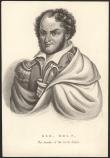Joseph Holt was a farmer and landowner in Wicklow County, Ireland. A Protestant and British loyalist, he held minor local government offices; but in 1797 he joined the United Irishmen, a liberal political movement that was entering a radical republican phase in the wake of the French Revolution, and began calling for the end of English dominion over Ireland. After Holt's house was burned down by local militia in 1798 (apparently as part of a private feud), he led a guerilla force into the Wicklow mountains, and began a resistance campaign that lasted for some months. Holt surrendered in November 1798, on the condition that he be sentenced, without trial, to transportation to New South Wales. He arrived in Sydney on the Minerva in 1800, with his wife and teenage son in tow.
While colonial authorities feared that Holt would lead the increasingly numerous Irish population in New South Wales in armed resistance against the government, Holt was focused on living quietly, and prospering by his experience with agriculture. On arrival, he accepted the management of Brush Farm, the estate of William Cox, who had also come on the Minerva. His past as a guerilla leader continued to make the colonial authorities anxious, however, and he was arrested several times (though not convicted). In the wake of the Castle Hill uprising of 1804, Holt was sent to Norfolk Island, but returned to New South Wales the next year. In 1809, by which time he owned his own farm, Holt received a free pardon.
In 1812, Holt sold his property in New South Wales and returned to Ireland on the Isabella, which was shipwrecked at the Falkland Islands on the way. When he eventually made it back to Ireland, Holt opened a pub in Dublin, but found that private feuds from his earlier days followed him and affected his business. In 1814 he retired to the seaside suburb of Dún Laoghaire; he died there in 1826.
About 1818, Holt began writing his memoirs, with the help of a number of assistants, possibly members of his own family. After his death, the manuscript was acquired by his neighbour Sir William Betham, who passed it on to the Anglo-Irish antiquary and folklorist, Thomas Crofton Croker, who edited and published the work as Memoirs of Joseph Holt: General of the Irish Rebels, in 1798 (1838).
 7434557183578521791.jpg
7434557183578521791.jpg
 7434557183578521791.jpg
7434557183578521791.jpg